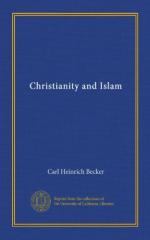We shall constantly see hereafter how much they owed in every department of intellectual life to the teaching of the races which they subjugated. Their attitude towards other beliefs was never so intolerant as was that of Christendom at that period. Christianity may well have been the teaching influence in this department of life as in others. Moreover at all times and especially in the first century the position of Christians has been very tolerable, even though the Muslims regarded them as an inferior class, Christians were able to rise to the highest offices of state, even to the post of vizier, without any compulsion to renounce their faith. Even during the period of the crusades when the religious opposition was greatly intensified, again through Christian policy, Christian officials cannot have been uncommon: otherwise Muslim theorists would never have uttered their constant invectives against the employment of Christians in administrative duties. Naturally zealots appeared at all times on the Muhammedan as well as on the Christian side and occasionally isolated acts of oppression took place: these were, however, exceptional. So late as the eleventh century, church funeral processions were able to pass through the streets of Bagdad with all the emblems of Christianity and disturbances were recorded by the chroniclers as exceptional. In Egypt, Christian festivals were also regarded to some extent as holidays by the Muhammedan population. We have but to imagine these conditions reversed in a Christian kingdom of the early middle ages and the probability of my theory will become obvious.
The Christians of the East, who had broken for the most part with the orthodox Church, also regarded Islam as a lesser evil than the Byzantine established Church. Moreover Islam, as being both a political and ecclesiastical organisation, regarded the Christian church as a state within a state and permitted it to preserve its own juridical and at first its own governmental rights. Application was made to the bishops when anything was required from the community and the churches were used as taxation offices. This was all in the interests of the clergy who thus found their traditional claims realised. These relations were naturally modified in the course of centuries; the crusades, the Turkish wars and the great expansion of Europe widened the breach between Christianity and Islam, while as the East was gradually brought under ecclesiastical influence, the contrast grew deeper: the theory, however, that the Muhammedan conquerors and their successors were inspired by a fanatical hatred of Christianity is a fiction invented by Christians.
We have now to examine this early development of Islam in somewhat greater detail: indeed, to secure a more general appreciation of this point is the object of the present work.




